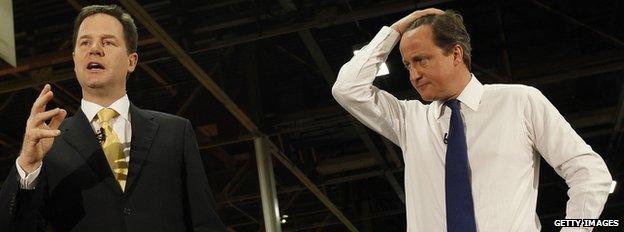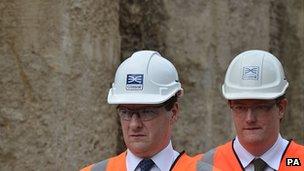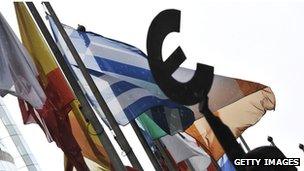Coalition flashpoints: Where the Tories and Lib Dems could fall out
- Published

The summer break has given the Conservatives and Liberal Democrats a chance to regroup after coalition strains almost reached breaking point over House of Lords reform.
But with many policy areas on which their two parties are potentially at odds and growing dissent on the backbenches, David Cameron and Nick Clegg look set for a stormy time when MPs return next week.
Here are five key flashpoints that could fuel coalition tensions in the coming months.
THE ECONOMY, STUPID
Agreement over tackling the deficit and "rebalancing" the economy is said to be the glue which holds the coalition together. But are the cracks beginning to show?
The double dip recession and bad borrowing figures have led to a fresh bout of soul-searching among Conservative and Lib Dem MPs about whether the government's strategy is working.
Few are willing to call publicly for a Plan B of the kind Labour is urging.
But some Lib Dems now suggest the coalition would have been better to follow the more gradual austerity plan they advocated before the 2010 election while some Tories have called for a complete rethink of existing policies on bank lending and quantitative easing.

George Osborne and his Lib Dem deputy are under growing pressure to get the economy moving
There is agreement at the top of government on the need to stick to the current approach while doing more to spur growth - but backbench MPs, no doubt feeling the heat from hard-pressed constituents, are growing restive.
Many Tory backbenchers want the emphasis to be on "supply side" reforms to boost competitiveness, such as lower business and personal taxes, deregulation and making it easier for firms to hire and fire workers.
But many Lib Dems prefer a form of "stimulus" in the shape of extra spending on areas such as transport, council housing and energy efficiency.
The Treasury is thought to be considering ways of shifting more resources to employment-friendly capital spending, on big infrastructure projects, while also launching a fresh assault on red tape.
The two parties have reached compromises on tax and other economic issues in the past. But if growth remains anaemic, can David Cameron and Nick Clegg square the circle and keep both their parties happy?
OUR FRIENDS IN BRUSSELS
Europe has always been one of the clearest dividing lines between the Lib Dems and Conservatives, and it continues to be a source of friction between the two parties.
The possibility of an 'in-out' referendum, which could see Conservative and Lib Dem backbenchers campaigning on different sides, remains remote for the time being.

Tories and Lib Dems rarely see eye-to-eye on Europe
But there is plenty for the two sides to disagree on, such as the size of the EU's next Budget, reform of the European Court of Human Rights, a British Bill of Rights and whether the UK should demand powers back from Brussels in exchange for supporting further eurozone integration including a banking union.
Conservatives committed to staying within the EU regard such a reset as a priority but they believe Nick Clegg is largely happy with the status quo.
The Lib Dems remain highly suspicious of David Cameron's intentions since his use of the veto at last December's summit on the future shape of the EU.
Whether the prime minister chooses to replace current Europe minister David Lidington with a more combative figure in a reshuffle could set the tone.
WHO'S WATCHING YOU?
The parties have largely seen eye-to-eye so far on issues involving civil liberties and security, scrapping identity cards and modifying control orders among other measures.
But there is the makings of a major dispute over plans for what ministers call an "enhanced framework" of data retention and monitoring to help combat crime.
Proposed legislation would force telecoms companies to store details of internet use for a year, including people's activity on social network sites, webmail, internet phone calls and online gaming.
The police and the intelligence agencies would have access to information about who sends messages, from where and when, although they will not be able to see the content.
Critics, including some Tory MPs, have called it a "snooper's charter". But the real opposition could come from the Lib Dems who have threatened to veto it unless there are sufficient safeguards in place.
NOT TAKING OFF
While there are different shades of opinion about high-speed rail, urban and motorway speed limits and road tolls, aviation is the real transport issue with the potential to put a thorn in the coalition's side.

The government has postponed its draft aviation strategy
At the last election, the two parties were united in their opposition to a third runway at Heathrow and the coalition agreement rules this out for the length of the current Parliament.
Many Conservative MPs now want the matter to be reopened, citing the economic and trade benefits of increased capacity and the risk of the UK losing critical routes to rival "hubs" in Europe.
They say expanding either Heathrow, Gatwick or Stansted by 2020 remains the "only viable" option, but many Lib Dems want to rule that out entirely.
Lib Dem activists will be asked at next month's party conference to back a moratorium on new runways at the three largest airports in the south-east of England.
The Lib Dems agree with Mayor of London Boris Johnson that a case for a new airport should be examined although they reject his proposed location east of London.
And influential Lib Dem MPs say there should be no net increase in capacity in the south-east, raising the possibility of existing runways being closed to make way for new ones at any future airport.
ROAD TO 2015
Some of the faultlines in the coalition stem from concerns about the parties' future electoral prospects and individual MPs' chances of re-election.
The Conservatives are worried about whether they can secure a working majority for the first time in more than 20 years at the next election - scheduled for 2015.
The Lib Dems are concerned about their ability to remain a substantial force in Parliament and, in the event of another inconclusive result, potentially continue to hold the balance of power.
This underpins arguments about now shelved reforms of the House of Lords and plans to shrink the House of Commons and reconfigure parliamentary boundaries.
The Lib Dems have threatened to block the latter plans when they are voted on next year in retaliation for Tory opposition to the Lords overhaul.
This could scupper the coalition's entire political reform agenda and endanger its whole future.
In such an event, could a compromise agreement be reached - perhaps involving changes to party funding - to keep the coalition show on the road until 2015?